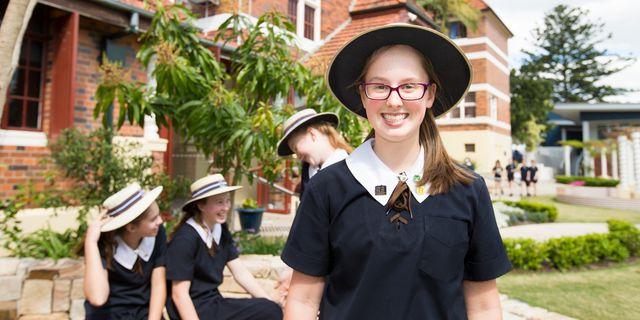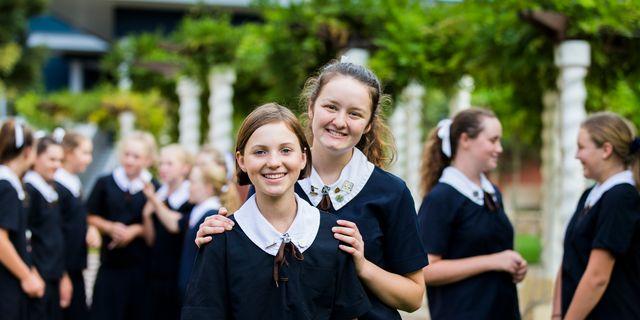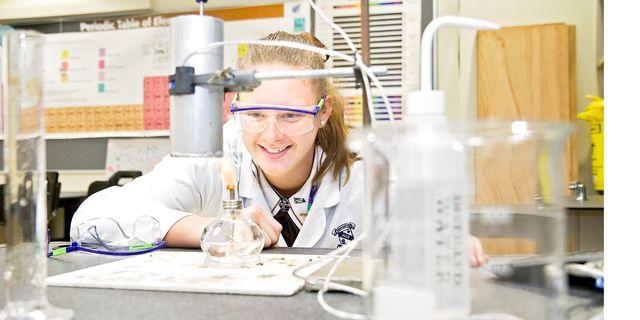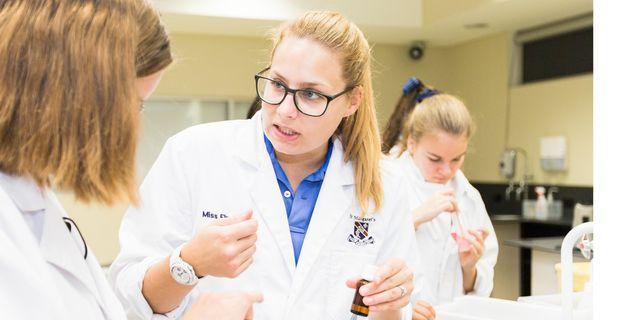Head of Faculty - Science and Technology
St Margaret's Anglican Girls School
Ascot
- Expired
- Job type:
- Full Time, Fixed Term
- Start date:
- 1 January 2018
Job overview
St Margaret’s Anglican Girls School is one of Queensland’s leading independent schools, fostering in students confidence, compassion, academic excellence and a life long love of learning. We look for all staff to be committed to and in harmony with the Anglican ethos of the school.
We are currently inviting applications from science teachers for the following middle leadership role to commence in January 2018;
Head of Faculty – Science and Technology - Subjects in the Science and Technology Faculty include: Junior Science (Years 7 – 10), Digital Technologies (Years 9 – 10), STEM (Year 9 and 10), Biology (Years 11 and 12), Chemistry (Years 11 and 12), Physics (Years 11 and 12), IPT (Years 11 and 12)
The Head of Faculty role provides leadership in three key areas:
- Management of the Faculty, its People and Resources
- Strategic Leadership in Curriculum and Pedagogy
- Quality of the Teaching and Learning program in the Faculty
The successful candidate will be an experienced teacher and either possess recent middle management experience or be actively working towards a role in leadership. Given the school’s focus on science in the faculty, the successful candidate will be qualified to teach science subjects to a senior level.
You will be an exceptional teacher and have the ability to motivate and guide teachers in the faculty to ensure they are able to maintain a high level of education. Your passion for teaching and the sciences will ensure you are constantly researching the latest changes to curriculum and resources hence ensuring the faculty remains progressive.
This role is to commence in January 2018 and will be offered initially on a 5 year contract.
Applications are to be addressed to the Principal and received by midday on Friday 22 September 2017.
St Margaret’s supports the rights of children and young people and is committed to the safety, welfare and well-being of students and expect all staff and volunteers to share this commitment. All candidates are required to undergo a screening process as part of the recruitment process and successful candidate must comply with School policies and relevant legislation relating to Student protection.
Attached documents
About St Margaret's Anglican Girls School
St Margaret’s Anglican Girls School is an independent day and boarding school for girls from Pre-Prep to Year 12. We also welcome boys in Pre-Prep and Prep.
There are approximately 890 students in the school, with around 280 primary students and 610 girls in the secondary school. St Margaret's has a long and proud boarding history and around 170 boarders from Years 5 to 12 are accommodated in the boarding house, which is in the very heart of the Ascot campus.
St Margaret’s is well known for its focus on academic excellence, quality learning and teaching, and its commitment to pastoral care. Its smaller size is its greatest strength, with a true focus on each individual child and personalised learning.
St Margaret’s girls are engaged, enthusiastic and energetic in all they do. They embrace the many extracurricular opportunities available, which make for very vibrant sporting, music and performing and visual arts programs. Additional clubs and activities also allow girls to explore a range of interests.
St Margaret's is a local school with a global outlook, offering students a variety of international learning opportunities through an extensive global exchange program in Year 10 and touring options.
The staff at St Margaret’s are highly qualified and committed to the learning and the wellbeing of the students in their care. The school's six core values - Spirit, Faith, Integrity, Courage, Respect and Passion - and the school's motto,Per Volar Sunata (Born to Fly Upwards), inspires St Margaret's students to grow and achieve their personal best in all endeavours.
As a school of the Sisters of the Society of the Sacred Advent, worship and spiritual development stand at the centre of St Margaret's. In addition to weekly religious and values education classes, students participate in regular prayer, reflection and formal worship. Age-appropriate liturgies are supported by regular chapel services and whole school celebrations of major Christian festivals occur throughout the year.
Learning
At St Margaret’s we are committed to giving each student a deep learning experience through the provision of a broad, balanced and flexible curriculum within an optimal learning environment. The factors we have identified as being fundamental to good learning are articulated through our own Framework of Quality Teaching and Learning. They can be categorised in terms of environment, process and pedagogy. When these three dimensions are considered with a view to fostering high quality student and teacher engagement then deep learning is the outcome.
At St Margaret’s we believe that the best learning environments are characterised by five key pillars: connection, differentiation, motivation, challenge and feedback. These five pillars form the foundation of pedagogical practice, inform curriculum development and shape the thinking which underpins educational leadership at the School. Together they enable the provision of optimal learning experiences through thoughtful pedagogy and a systematic, transparent approach to deep and sustained learning.
St Margaret’s aims to provide students with an understanding of the learning process and how it feels. Our taxonomy of learning articulates three stages as being central to the learning process - surface, deep and deeper. Categorising learning in this way allows us to engage students in a discussion of different types of thinking with a view to pushing them towards metacognitive functioning.
St Margaret’s aims to provide students with an understanding of the learning process and how it feels. Our taxonomy of learning articulates three stages as being central to the learning process - surface, deep and deeper. Categorising learning in this way allows us to engage students in a discussion of different types of thinking with a view to pushing them towards metacognitive functioning.
Please note that you are wholly responsible for fact checking in respect of the information provided by schools. Please also check for the latest visa and work permit requirements that may apply. Tes is not responsible for the content of advertisements or the policies adopted by advertising schools. Tes asks that all schools follow Tes' Fair Recruitment Policy.





